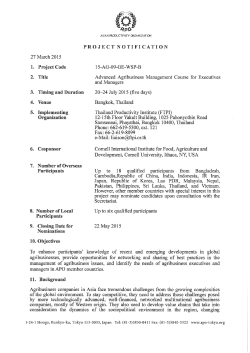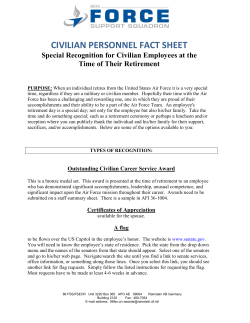
Document 303523
'^p^ ASIAN PRODUCTIVirf OIl.GANIZATION PROJECT NOTIFICATION 4 July 2014 1. Project Code 14-IN-69-GE-WSP-B 2. Title Workshop on Green Productivity (GP) Manual Development: Compilation ofGP Case Studies 3. Timing and Duration 18-21 November 2014 (four days) 4. Venue Tokyo,Japan 5. Implementing Organization APO Secretariat Leaf Square hongo Building 2F 1-24-1 Hongo, Bunkyo-ku Tokyo 113-0033,Japan Phone: 81-3-3830-0416 Fax: 81-3-5840-5324 e-Mail: apo@apo-tokyo.org Website: www.apo-tokyo.org 6. Number of Overseas Participants Up to 15 qualified participants from Bangladesh, Rqiublic of China, India, Indonesia, IR Iran, Republic of Korea, Malaysia, Mongolia, Pakistan, Philippines, Singapore, Thailand, and Vietnam. However, other member countaies with special interest in this project may nominate candidates upon consultation with the APO Secretariat. 7. Number of Local Up to six qualified participants Participants 8. Closing Date for 1 October 2014 Nominations 9. Objectives To exchange infonnation on GP implementation and discuss the latest GP-related developments and major initiatives taken by member economies; and To analyze and select GP case studies from the Asia-Pacific for a publication that can be used for the training of trainers in GP and other GP-related projects. 10. Background GP is a sta'ategy for enhancing productivity and environmental performance for overall socioeconomic development. It involves the application of appropriate productivity and environmental management tools, techniques, and technologies to reduce the environmental impact of an organization's activities, goods, and services. It helps to increase profitability through improvements in productivity and enviromnental performance. The APO has been in the forefront in promoting this strategy in member countries for nearly two decades through various modalities including conferences, exhibitions, workshops, seminars, and training courses. It also provides financial support for developing model GP companies in member countries. In addition to these efforts, the APO has published GP training manuals and handbooks to provide guidelines and references for potential trainers and practitioners. 1-24-1 Hongo, Bunkyo-ku, Tokyo 113-0033, ;apan Tel: (81-3)3830-0411 Fax: (81-3)5840-5322 wn-w.apo-tokyo.org To develop more practitioners for the sustainable development of GP in member countries, the APO has been organizing an annual training course to focus on developing capable GP practitioners who undertake follow-up activities. In addition to this, the APO also initiated e- learning courses on GP covering fundamental knowledge and its application in industries. Since 2001, the APO has trained more than 250 GP practitioners and trainers through face-to- face courses focusing on the strategic and production levels so that they would be able to disseminate the knowledge gained through training and consultancy and apply it to actual plants or buildings, generating success stories. The APO also trained participants in energy efficiency, solid waste management, eco-labeling, renewable energy, material flow cost accounting, eco-tourism, the 3Rs, green supply chains, urban environment management, greenhouse gas emission reduction, etc. while promoting GP. It is therefore time to review follow-up actions taken by participants, successful examples of GP application, and the various tools and techniques used. The proposed workshop will discuss and analyze GP success stories and compile notable case studies for subsequent publication. It is believed that this document in the fonn of a manual will be handy in GP-related training courses organized by the APO and NPOs. 11. Scope and Methodology Case studies on GP applications including energy efficiency, solid waste management, ecolabeling, renewable energy, material flow cost accounting, eco-tourism, the 3Rs, green supply chains, urban environment management, greenhouse gas emission reduction, etc. The tentative program of the trainmg course is given below: Date/Time Activity Man., 17 November 2014 Tues., 18 November Wed., 19 November Thurs., 20 November Fri., 21 November Sat.. 22 November Arrival of participants in Tokyo Opening session Discussion of format of the workshop and review of the manual Discussion of manual format and presentation of GP case studies Presentation of GP case studies Discussion and selection of case studies for publication Closing session Departure of participants 12. Requirements of Candidates The participants are expected to possess the following qualifications: Present Position GP practitioners, consultants, and trainers who have successfully implemented GP (note: selected participants are required to prepare a case study in a fonnat to be provided later). Experience At least five years of experience in a related field. Education Preferably university degree or equivalent qualification. Language All proceedings of the project are conducted in English, and participants are frequently required to make oral and written presentations. They must therefore be proficient in spoken and written English. Those who are not proficient in English will not be accepted. Health Physically and mentally fit to attend an intensive program requiring participants to complete a number of individual and group activities and strenuous fieldwork. It is therefore recommended that member countries do not nominate candidates likely to suffer from physical and mental stress. -2- APO Certificate Participants are required to attend the entire program to receive the APO certificate of attendance. 13. Financial Arrangements To be borne by participants or participating countries a. Participants' insurance premiums: All participants should be fully insured against accident and illness (including hospitalization and death) for a principal sum equivalent to US$10,000.00 for the entire duration of the project and travel, and must submit to the APO Secretariat a copy of the comprehensive travel insurance certificate before participation. Such insurance should be valid in the host country. This insurance requirement is in addition to existing government insurance coverage in some member countries. If any participant is unable to insure himselfTherself as stipulated above, he/she should secure this insurance in the host country at the commencement of the project and pay the premium himself/herself, if necessary, from the per diem allowance provided. Neither the APO nor the implementing organizations wilt be responsible for any eventuality arising from accident or illness. b. All expenses related to visa fees and airport taxes. c. Any expenses incurred by participants for stopovers on the way to and from the project venue as well as for extra stay at the project venue before and/or after the official project period because of early arrival or late departure, for example, due to either limited available flights or any other reason. To be borne by the APO a. All assignment costs of overseas resource persons. b. Round-trip economy-class international airfare by the most direct route between the international airport nearest to the participants' place of work and Tokyo. As far as practicable, all participants should purchase discount tickets. Please note that the arrangements for the purchase of air tickets should follow the "Guide on Purchases of Air Tickets for APO Participants," which will be sent to the selected participants. It is also available on the APO website and from APO Liaison OfGcers in member countnes. c. Per diem allowances and hotel accommodation for up to 18 overseas participants for up to six days at the rate to be specified later. d. All local implementation costs. 14. Actions by Member Countries a. Each participating country is requested to nominate three or more candidates in the order of preference. Please ensure that candidates nominated meet the qualifications specified under section 12 above. b. No form of self-nomination will be accepted. All nominations must be endorsed and submitted by an APO Director, Alternate Director, Liaison Officer, or their designated officer. c. Please note that nomination of a candidate does not necessarily guarantee that he/she will be selected. Selection is at the discretion of the APO Secretariat. A basic criterion for selection is the homogeneity of the participants in terms of qualifications and work experience. Nonselection therefore does not mean that the candidates concerned are not competent enough. Sometimes candidates are not selected because they are overqualified for a project. -3- d. Each nomination should be accompanied by the necessary documents. A nomination lacking any of these documents may not be considered: two copies of the candidate's biodata on the APO biodata form together with a passport-sized photograph. The biodata form can be downloaded from the APO website (www.ap6-tokyo.org). We encourage submitting the biodata fonn to the APO Secretariat in electronic form as an attachment to a cover e-mail message from the APO Director, Alternate Director, or Liaison OfHcer. The nomination documents should be sent to the Industry Department, APO Secretariat (e-mail: ind@apo-tokyo.org, fax: 81-3-5840-5324). e. The APO Medical and Insurance Declaration/Certification Form. Every candidate must complete and submit a copy of the APO Medical and Insurance Declaration/Certification Form with his/her biodata at the time of nomination. Please note that self-declaration is sufBcient for candidates without any of health conditions or ilhiesses listed on the reverse side of the medical form. However, for all others, medical certification by a licensed physician on the reverse side of the medical form is required. f. Necessary documents are to be submitted electronically. In that case, there is no need to send a hard copy by postal mail. However, if the documents are submitted by fax, member countries are requested to mail the originals of the documents to the APO Secretariat as well. If a digital photograph of a nominee is not attached to the electronic biodata fomi, a hard-copy photograph should be sent to the APO Secretariat by postal mail. Please give the candidate's name and the project code on the reverse side of the photograph. g. Member countries are requested to adhere to the nomination deadline given on page 1 . The APO Secretariat may not consider late nominations as they have in the past resulted in considerable difficulties to the implementing organization in its preparatory work for the project. h. For member countries where nominations are required to be approved by higher government authorities and require a longer time, the APO Liaison Officers/NPOs are urged to send the names of nominees on or before the deadline, indicating that government approval will follow. i. If a selected participant becomes unable to attend, he/she should inform the APO Liaison Officer/NPO in his/her country immediately and give the reason for withdrawal. The NPO concerned is requested to transmit that information to the APO Secretariat and the host country promptly. j. NPOs are requested to infonn the selected participants that they are not to bring family members or to engage in any private business activities during the entire duration of the project. k. Each selected participant should be infonned to arrive at the venue one day before the start of the official project. Also, he/she is expected to return home upon completion of the ofBcial project because he/she is visiting the host country for the specific purpose of attending this APO workshop. 1. NPOs should inform participants that they must attend all four days of the project to qualify for the certificate of attendance. 15. Actions by the APO Secretariat a. Under nonnal circumstances, candidates who are selected will be informed of their acceptance at least four weeks prior to the start of the project. b. If some candidates fail to qualify or be unable to participate after selection, or if some member countries fail to nominate any candidate, their slots may be filled by alternates fi-om the same or another member country on a merit basis. -4- 16. Project Preparation Each selected candidate is required to prepare a GP case study prior to departure for the project venue. In preparing the paper, they are expected to follow the attached "Guidelines for the Preparation of Country Papers" to be provided later. 17. Evaluation of Participants If the conduct/attendance/performaace of a participant is not satisfactory, these will be reported to the APO director concerned. 18. Guide for Participants Other conditions for participation are given in the APO Guide for Participants, which is available from APO Liaison OfGcers/NPOs in member countries and on the APO website (www.apo-tokyo.org). Man Amano Secretary-General -5-
© Copyright 2025














